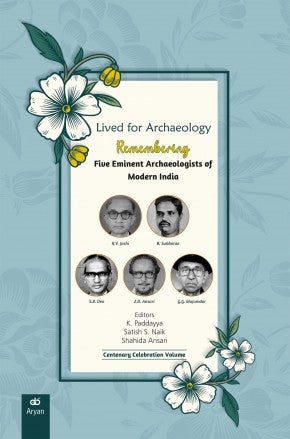Lived for Archaeology: FIVE EMINENT ARCHAEOLOGISTS OF MODERN INDIA – R.V. Joshi, B. Subbarao, S.B. Deo, Z.D. Ansari and G.G. Mujumdar
Lived for Archaeology: FIVE EMINENT ARCHAEOLOGISTS OF MODERN INDIA – R.V. Joshi, B. Subbarao, S.B. Deo, Z.D. Ansari and G.G. Mujumdar is backordered and will ship as soon as it is back in stock.
Couldn't load pickup availability
Genuine Products Guarantee
Genuine Products Guarantee
We guarantee 100% genuine products, and if proven otherwise, we will compensate you with 10 times the product's cost.
Delivery and Shipping
Delivery and Shipping
Products are generally ready for dispatch within 1 day and typically reach you in 3 to 5 days.
- Type: English
- Pages: xx + 212
- Format: Hard Bound
- ISBN: 9788173057083
- Edition: 1st
- Publisher: ARYAN BOOKS INTERNATIONAL
- Size: 17 cm x 25 cm
- Product Year: 2024
The essays as well as reminiscences comprising this book are of historiographical interest and deal with the contributions of five distinguished archaeologists who were active during the first three or four decades after independence. All of them were closely associated with the legendary archaeologist Professor H.D. Sankalia and the famed Department of Archaeology at the Deccan College in Pune which he had founded in 1939. R.V. Joshi, B. Subbarao, S.B. Deo and Z.D. Ansari were pupils (later colleagues) of Professor Sankalia. Their field investigations were prolonged and pan-Indian, and covered in particular prehistory, protohistory and early historical archaeology. G.G. Mujumdar established a chemistry laboratory at the Deccan College and pioneered studies in pottery replication, soil chemistry and other branches of archaeochemistry. All of them carried forward the high traditions which the Deccan College had set in critical scholarship, teaching and publications. Pooled together, their work illustrates both the depth and the range of contributions made by workers in Western India towards making Indian archaeology a very vibrant and respected branch of study during the first half of the post-independence period.





